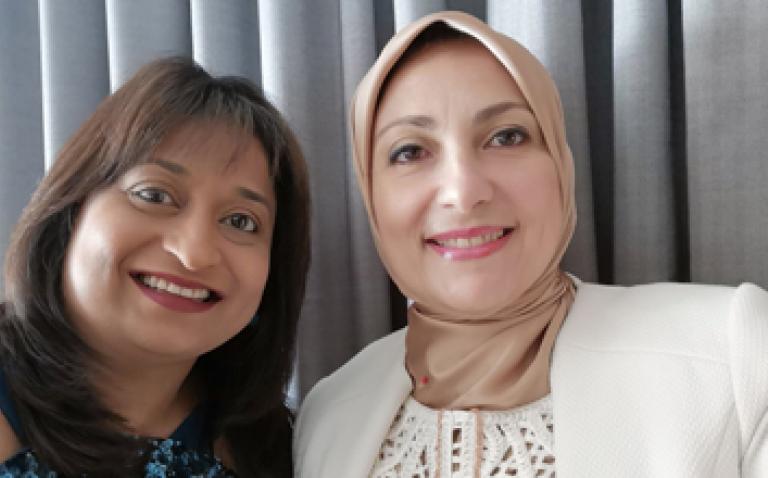An award winning hospital team dedicated to tackling antimicrobial resistance talk about their efforts to tackle this issue and why staff engagement is essential to running a successful programme
Hala Kandil, microbiology consultant and antimicrobial resistance (AMR) lead, and Tejal Vaghela, lead antimicrobial pharmacist work together at West Hertfordshire Hospitals NHS Trust in the UK to help tackle antimicrobial resistance.
Their achievements speak volumes about the efforts they have taken to address the issue, which include sustained reduction of antibiotic use in patients, increased staff engagement, international presentations and an award recognising their dedication to AMR stewardship and prescribing.
A dangerous problem
Dr Kandil says the inspiration behind the team working to tackle AMR was the rapid and worldwide emergence of resistant bacteria, that is “endangering the efficacy of antibiotics, which have transformed medicine and saved millions of lives”, she says.
She explains the resistance has been attributed to the “overuse use and misuse of antibiotics and also the lack of new drug development by the pharmaceutical industry”.
“Whether it is due to reduced economic incentives or challenging regulatory requirements, which is another concern, there is a need for an urgent coordinated effort to manage the antibiotic crisis,” she says.
In recent years, she says the trust had an increasing number of patients who had acquired infections with multi resistant pathogens, leaving a limited choice of antibiotics to treat them. In addition, the trust had also seen increased Carbapenemase Producing Enterobacteraeciae (CPE). These issues highlighted a need for the trust’s antimicrobial stewardship team to put in place new initiatives to tackle AMR.
Working for change
Responding to this need, in 2016 Dr Kandil and Ms Vaghela implemented a comprehensive antimicrobial stewardship programme (CASP), which focused on the three specific aims of the Government’s UK five year AMR strategy: improving AMR knowledge and understanding, stewardship of existing treatments and promoting innovation and rapid diagnostics.
They also concentrated the programme’s main intentions, which were: better use of surveillance data, optimising prescribing practice through implementation of antibiotic ward rounds and promoting rational prescribing, better use of existing and new rapid diagnostics, and improving professional education, training, and public engagement.
To help ensure better use of surveillance data, the team introduced local annual surveillance programmes looking at epidemiology and resistance within the trust to inform antibiotic guidelines. Dr Kandil says they have “improved education and engagement with trust staff by encouraging junior doctors to audit antimicrobial use”.
They have also presented their audit of AMR at international conferences, such as the European Congress of Clinical Microbiology and Infectious Diseases (ECCMID)– a clinical microbiology and infectious diseases event– to share knowledge and experience.
The team has visited primary and secondary schools to raise awareness of AMR and worked closely with their clinical commissioning group (CCG) to prepare and present activities and knowledge about antibiotics and ‘bugs’. “One activity we carry out is asking children to put insulating tape on balloons to show the resistance, and then we ask them to burst the balloons to show how resistance bugs become,” says Ms Vaghela.
They also work closely with the trust’s clinical team to ensure early diagnosis and treatment of sepsis for various awareness campaigns, and have appointed a new dedicated sepsis nurse who attends ward rounds to speak to doctors and raise awareness about early signs of sepsis and to audit practice.
A team effort
The team has introduced a rapid molecular diagnosis for viral respiratory tract infections over the winter season, which has resulted in “a significant reduction of antibiotic use by 1.2% in the winter 2016-2017 compared to previous years. And the rapid diagnostics also contributed to prompt implementation of infection control measures,” says Dr Kandil.
Thanks to the team’s efforts, staff engagement in the trust with Antimicrobial Stewardship (AMS) has increased and involves not only senior medical staff, but also pharmacists, junior doctors and medical students. Working closely with clinicians in different specialities “has improved patients outcome and has raised the profile of this issue”, the team says.
The trust’s overall usage of antibiotics per 1000 admissions has reduced and its piperacillin-tazobactam use was also reduced by 19% in 2017/18. “Further and sustained reduction of total antibiotics is a significant achievement and will contribute to reducing selection pressure for resistant organisms.
“This achievement had also contributed to change in prescribing behaviour among our staff,” the team says.
Local surveillance has increased the awareness to the global issue of AMR and has resulted in trust staff “being able to relate this global issue to their patients.
“Also recognising our local resistance pattern has allowed us safely to omit an unnecessary combination therapy, reserving our antibiotics and avoiding common side effects,” the team says.
Recreating this success
Other hospital teams looking to tackle AMR will need to implement “comprehensive quality improvement activities that act as a cohesive programme aiming to optimise the use of antimicrobials, improve patient outcomes and reduce the incidence of health care associated infections”, says Dr Kandil.
The value of the team’s approach was recognised this June [2018], when the trust’s AMS programme was ‘highly commended’ at the Antibiotic Guardian Awards under the category of antimicrobial stewardship and prescribing.
But the rewards of engaging all healthcare staff with a programme dedicated to AMR issues is also evident in everyday practice at the trust, whatever the job title, from porters to medical directors as Ms Vaghela has found.
“We were promoting European Antibiotic Awareness Day at the trust when a hospital porter stopped me and told me all about antimicrobial resistance and how he would only use antibiotics if necessary. He said he would not force his GP to give him antibiotics, partly because of the work we’ve been doing, such as putting up posters about AMR around the hospital.
“Walking around the hospital that day, it was great to see porters engaged with the programme as well. Engagement. That’s the key to a successful AMR programme.”










